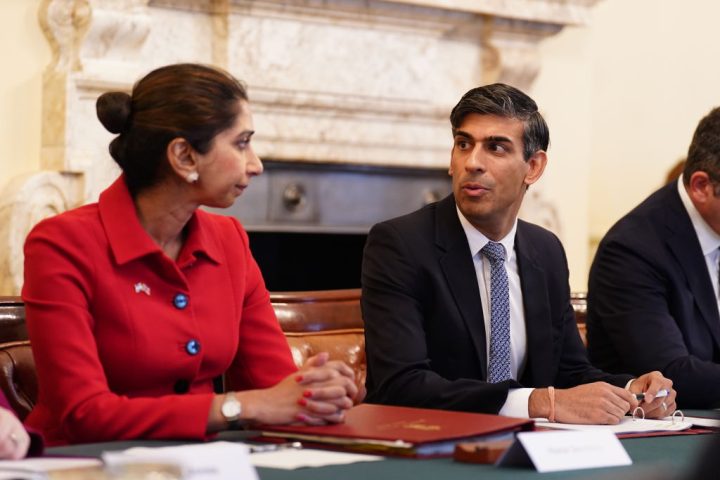Can Rishi Sunak still catch a break or has the plughole spiral of British politics now dragged him firmly into its unsparing ambit? It is just possible that he will come up for a lungful of air on Wednesday, when the Supreme Court delivers its long-awaited verdict on whether the Rwanda scheme is legal. More likely, the justices will rule the plan incompatible with their ever-more elastic interpretations of European Convention rights, sending him whirling further downwards.
Suella Braverman probably won’t be Home Secretary by then. Or, if she is, she will probably walk should Sunak fail immediately to come round to her view that we must now leave the Convention and its supervisory court in Strasbourg.
This is a Prime Minister heading into winter not doing any of the things he told us were his top priorities when Jack Frost was last nipping at our toes: not halving inflation, not growing the economy, not reducing debt despite his desperate protestations to the contrary, not bringing down NHS waiting lists and not stopping the boats.
Sunak completely missed the target
His legislative programme, outlined in the King’s Speech, did not merely fall foul of the lack of any unifying common theme – as legislative programmes tend to do – but did not even have exciting individual elements in it. He is also not being an effective national leader in the face of those accursed ‘events’ that Harold Macmillan once identified as the biggest challenge for any prime minister.
Sunak completely missed the target when it comes to giving a strong lead about the shocking outpourings of Islamist militancy on the streets of our major cities. Worse than that, it did not even seem to occur to him that he needed to loose off a shot at all. He just carried on geeking at his AI conference, culminating in a surreal soft-ball interview with Elon Musk.
The US president Theodore Roosevelt coined the term ‘bully pulpit’ to describe the opportunity that a democratic mandate and occupation of the highest office in the land affords a statesman to direct the national conversation. But Sunak lacks a mandate of his own and has no forceful personality with which to drive the agenda. Often he gives the impression that he lacks opinions about the best direction of travel across vast swathes of policy areas.
So he is adrift on currents of other people’s making: in office but not in power, as was said of late-stage John Major by Norman Lamont. Major checked out to watch cricket at the Oval after his landslide defeat. Many backbenchers fear that Sunak is already California dreaming, months before his looming appointment with the UK electorate.
Whatever fashionable opinion may declare about the vulgarity of Braverman, nobody can doubt what she stands for or her determination to pursue goals that she communicates in broad brushstrokes and in technicolour. The same clarity of purpose applies in the case of Kemi Badenoch, who is playing much more of a team game and may be the ultimate political beneficiary of Braverman’s divisive hyperactivity.
Sunak, by contrast, continues to follow the old nostrums of ‘centre groundism’, constantly triangulating between two voter tribes who despise each other and increasingly despise him as well. According to YouGov, 80 per cent of people who voted Conservative in 2019 wanted to see the Armistice Day pro-Palestine march banned. After a month of mob calls for jihad, intifadas and the destruction of the state of Israel this should not come as a surprise to any student of Conservative opinion.
Of course, this isn’t the precise point of friction between Sunak and Braverman. But gut Conservatives will have detected that he backed down in the face of establishment resistance while she did not. Meanwhile the Centrist Dad vote has hopped over to Labour and isn’t coming back anytime soon, despite his Mr Reasonable entreaties.
The thing to bear in mind about Braverman is that she is a proven killer of floundering premiers: one of the Brexit Spartans who ensured Theresa May’s departure; an immigration sceptic whose resignation helped speed Liz Truss on her way; the key assassin of Boris Johnson’s brief hopes of a restoration.
Her personal following on the backbenches may not be huge, but it is much bigger than the 'half a dozen MPs' punted by her enemies on the Tory left and quite possibly big enough to spark a confidence vote in Sunak given his drastic under-performance since the summer.
As one backbencher on the right puts it: ‘Having yet another leadership contest would be ludicrous. But the atmosphere has changed in the last fortnight. Things are falling apart so fast that it is starting to look like the worst option apart from all the others.’







Comments